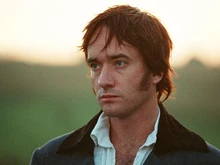Mr. Fitzwilliam Darcy is a wealthy gentleman who has an income of £10,000 a year.[2] He owns a large estate called Pemberley in Derbyshire, England. He is the eldest child and only son of Mr. Darcy and Lady Anne Darcy, both deceased. Lady Anne was a daughter of an earl and her maiden name was Fitzwilliam, which connects Darcy to the aristocratic Fitzwilliam family. Mr. Darcy is also the nephew of Lady Catherine de Bourgh, and the first cousin of Anne de Bourgh and Colonel Fitzwilliam. His wife and true love is Elizabeth, the female protagonist of Pride and Prejudice.
Biography
In Meryton
Mr. Darcy is a wealthy gentleman with an income exceeding £10,000 a year, and the proprietor of Pemberley, a large estate in Derbyshire, England. Darcy slighted Elizabeth Bennet at their first meeting; however, he soon realized that her first impression was not the whole of it, and upon discovering her playful spirit and attractive eyes among other characteristics, he found himself very much attracted to her.
He later attempted to court her while simultaneously struggling against the beliefs about class that he had grown up with. At the same time, Darcy disapproved when his friend Mr. Bingley expressed his love for Elizabeth's elder sister Jane and subtly convinced Bingley that Jane did not return his feelings, something which he honestly believed. He secretly felt guilty because he knew he himself had fallen in love with a social inferior: Elizabeth Bennet. It was therefore hypocritical of him to separate Charles Bingley and Jane.
Upon reflection, he knew this, so he decided to thereafter suppress his feelings for Elizabeth and pay her less attention. And although he didn't realize it, Elizabeth's discovery of Darcy's interference in Bingley and Jane's budding relationship and Mr. Wickham's tale of his mistreatment by Darcy had caused her to dislike him intensely, even more so than she had before.
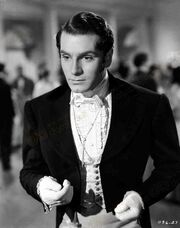
Laurence Olivier as Mr. Darcy
First proposal and letter to Elizabeth
Eventually, Mr. Darcy declared his love for Elizabeth and proposed; yet, while expressing his ardent love, he kept reminding her of the large gap in their social status. Elizabeth was offended and vehemently refused him, expressing her reasons for disliking him, including her knowledge of his interference with Jane and Bingley, and the account she received from Mr. Wickham of Darcy's alleged unfair treatment toward him. Further insulted by Darcy's hurt retorts, Elizabeth claimed that the manner in which he proposed to her prevented her from feeling concern for him she "might have felt had [he] behaved in a more gentlemanlike manner". Darcy departed in anger and mortification and, that night, penned a letter to Elizabeth in which he defended his honor, revealed the motives for his interference in Jane and Bingley's relationship, and gave a thorough account of his lifelong dealings with Wickham, who attempted to seduce and elope with Darcy's younger sister, Georgiana, the previous summer. He later said that he had been feeling very much wronged while writing this letter, which explained the heat of his defenses and his haste in writing.
Realizations and visit at Pemberley
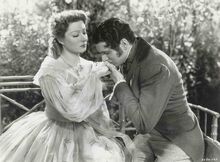
Although initially angered by Elizabeth's vehement refusal and harsh criticism, Darcy was surprised to discover the reality of how his behaviour was perceived by others, particularly Elizabeth, and committed himself to re-evaluating his actions.
A few months later, Darcy unexpectedly encountered Elizabeth during her visit to his estate in Derbyshire with her aunt and uncle. Elizabeth was, at first, mortified to be discovered at Pemberley, having only visited on the belief that Darcy was absent. However, she was surprised to discover a marked change in Darcy's manner. In response to Elizabeth's criticism and due to his subsequent realizations, Darcy was determined to display the "gentleman-like manner" she accused him of lacking, and astonished her with his kindness towards both her and her aunt and uncle, Mr. and Mrs. Gardiner. He was more courteous and less reserved than he had been previously, surpassing, therefore, not just Elizabeth's, but her aunt and uncle's, expectations. He also introduced Elizabeth to Georgiana, which Elizabeth saw as "a compliment of the highest kind."
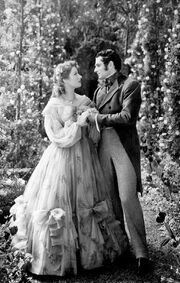
Confronting Wickham and finding Lydia
When Elizabeth found out that her youngest sister, Lydia, had eloped with Wickham, Mr. Darcy happened upon her, and saw that she was distressed. Elizabeth confided the truth to him, and he showed civility, consoling Elizabeth over her distress. He left, and promptly decided to head to London to find Lydia and Wickham. Darcy eventually found the errant couple, although he tried to hush the matter up. Only Elizabeth's aunt and uncle, outside of Wickham himself and Lydia, knew of Darcy's involvement in the affair. It would have continued this way had Lydia not dropped the hint. That hint prompted Elizabeth to write to her aunt to tell them the truth, which her aunt couldn't refuse. Darcy later told Elizabeth that he had seen the distress the elopement had caused her, spurring him to find the couple. He revealed that he did not do it to earn Elizabeth's gratitude, but rather to ease her distress. Darcy also did so, because he felt himself partially responsible for the event, in failing to warn both the Bennet family and the public of Wickham's true character. It was hinted that Darcy's intervention to help Elizabeth cost him as much as a year's income. In addition, to find Lydia, he had to confront Wickham, which was hardly an agreeable experience for either. He may or may not have threatened Wickham and/or paid him additional sums to convince him to marry Lydia.
Second proposal
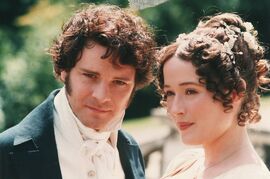
Mr. Darcy and Lizzy Bennet
Darcy then released Mr. Bingley to return to Longbourn and woo Jane, accepting his misjudgment of her character. Darcy went to London, and Lady Catherine stopped by, after confronting Elizabeth over a rumor she heard of Darcy and Elizabeth soon to be engaged. Though Elizabeth denied a proposal being made, she refused to give him up when Lady Catherine demanded, as she wanted Darcy to marry her daughter, Anne. Lady Catherine related this to Darcy, believing he would think Elizabeth to be an unfit match. Instead, the discussion made him hope, at last, that Elizabeth reciprocated his feelings. While calling at Longbourn with Mr. Bingley, the gentlemen went on a walk with Elizabeth, Jane, and their younger sister, Kitty. Bingley and Jane soon dropped behind and, once Kitty went towards the Lucases, Darcy and Elizabeth were alone. Once he was sure it was true, Darcy proposed to Elizabeth again and she accepted him this time. The couple reflected on their mistakes, and Darcy thanked Elizabeth for showing him the error of his ways: "By you, I was properly humbled."
Personality
His manners drew the contempt of many in Meryton as they perceived him as proud, sanctimonious, and inconsiderate due to his status. He was shown to be cold and aloof, with such a temperament being misconstrued as sheer arrogance. The narrator described him as clever but also as "haughty, reserved, and fastidious," with manners that, "though well-bred, were not inviting." This was shown to be only natural reserve and a discomfort in company that made him uneasy and defensive. His lack of "inviting qualities" was also due his arrogant disposition towards the lower classes in the beginning of the novel. He told Elizabeth on their walk that he was brought up to do the right thing, but not taught to be humble. Due to his status and the fact that he spent much of his childhood as an only child, his parents never taught him to control his temper or his pride.
This proved true, as his distant manner and apparent contempt for those around him earned the disdain of Elizabeth and many others, particularly in light of the claims of the charming George Wickham—that he was wronged by Darcy, however, it was eventually revealed that these first impressions were erroneous: Darcy's seemingly arrogant character masked a sincerely generous and upright nature, and it was Darcy, in fact, who was wronged by Wickham, whose own character was revealed to be untrustworthy and duplicitous.
As the novel progressed, Darcy was eventually revealed to be a conscientious landlord who was generous, kind and unselfish, a caring brother, a good friend - his impulsive interference between Jane and Bingley was motivated by genuine concern for his friend rather than malice - and a scrupulous and extremely honourable man who was protective of and self-sacrificing for those he cared about. Despite his pride, he was willing, to an extent, to admit wrongdoing. And while he possessed ingenious judgement, he was shown to not completely doubt the heart, especially his own.
Physical Appearance
In the novel, Darcy was described to be a tall, stately, well-built, and handsome man with an air of nobility.
Relationships
Elizabeth Bennet
Elizabeth and Darcy's evolving relationship is the main focus of the novel. In the beginning, Mr. Darcy did not think much of Elizabeth because he saw her inferior to him in class. However, he started to admire her beauty and intellect as they became better acquainted, but was still held back by their difference in class. Mr. Darcy proposed to her, still stating how they were not equal, but he still loved her with the utmost passion. He was taken aback when Elizabeth rejected him, and stated that she never considered him as a potential husband due to his prideful manner. Hurt by his own pride, he wrote to Elizabeth to explain himself, but later regretted this, as he came to understand his own pride & ill-formed prejudices.
Mr. Darcy's manners changed when he next saw Elizabeth, showing more diplomacy, charisma, and hospitality to both her and her relations, changing her opinion and earning the respect of her aunt and uncle. His love for Elizabeth remained strong throughout this change in character, to the point that he saved her family from ruin. When he proposed again and Elizabeth accepted, Mr. Darcy told Elizabeth how his love for her humbled him and made him understand his own character better. He no longer considered his station as a barrier, and believed he and Elizabeth were equals, strengthening their love and changing Mr. Darcy for the better.
George Wickham
Although he and George Wickham were raised together just like they were brothers, they ended up becoming enemies later due to how Wickham treated Georgiana, and spurned the life Darcy's father had planned for Wickham. When Wickham acquired debts around Derbyshire, Darcy paid them off, in part as a courtesy to his father, but also to uphold his family prestige. After Wickham ran away with Lydia, Darcy blamed himself for not telling the truth about Wickham, and letting Elizabeth's family be ruined. Out of love for Elizabeth and to make up for his own pride, he ensured that Lydia and Wickham married, and that Wickham would continue to serve in the army. He continued to help Wickham's career and pay off debts, for his father's sake and Elizabeth's.
Charles Bingley
Charles Bingley was one of Darcy's closest friends in the novel, despite their contrasting personalities; Bingley was far more congenial than Darcy, who maintained a reserved countenance. They met while both were attending Cambridge. In the novel, he quickly became attracted to Jane Bennet, although Darcy dissuaded him from proposing to her, with the help of Bingley's sisters, believing she did not really love him and was only after Bingley's money. The two had a brief falling out, but quickly reconciled.
Caroline Bingley
Caroline Bingley was infatuated with Mr Darcy, and wished to marry him, though her interest was superficial, and she was only interested in gaining the prestige of being his wife and marrying someone who was her equal in wealth. Mr. Darcy, though, never showed an interest in Caroline beyond friendship, despite her many attempts to gain his attention. When Darcy showed an attraction to Elizabeth, Caroline tried to dissuade him by talking of Elizabeth's inferior status to him and the Bingleys. Darcy, though, refused to tolerate Caroline's insults, and praised Elizabeth, mortifying Caroline. After Darcy married Elizabeth, Caroline was chagrined, but decided to maintain a friendship for her own sake.
Georgiana Darcy
Darcy was close to his younger sister, Georgiana, even though she was twelve years younger than he was and his ward, and they frequently wrote long letters to each other. Georgiana was very much in awe of her older brother, whom she viewed as the nearest thing she had to a father since the death of their own. Darcy doted on her, even having a room redecorated at Pemberley and buying a new pianoforte for her as gifts after she took a liking to the room the year before.
Extended Family
- Main article: Lady Catherine de Bourgh
As his mother's sister, Mr. Darcy showed Lady Catherine de Bourgh respect as was due to a relation, but no more, despite Lady Catherine believing otherwise. He did not tolerate her pride and conceit any more than Elizabeth did, and was capable of holding his own against her. He pursued Elizabeth, despite Lady Catherine wishing him to marry her own daughter, Anne. He thought little of her opinion, shown when Lady Catherine tried to talk him out of marrying Elizabeth, but instead, he felt encouraged to propose to Elizabeth. When Lady Catherine disapproved of Mr. Darcy marrying Elizabeth, Mr. Darcy was inclined to sever ties with his aunt, as he would not stand for her insulting Elizabeth, and remained as stubborn as Lady Catherine. It was only on Elizabeth's intervention that Mr. Darcy agreed to mend fences with his aunt after his marriage.
Usually known as
- Darcy - as addressed by his friends Mr. Bingley and Colonel Fitzwilliam.
- Mr. Darcy - Following his father's death, people who are unable (by entitlement or privilege) to call him by another name have addressed him as such. Before his father's death, he might have been Mr. Darcy in circumstances in which his father was not present or where it was obvious that his father was not being referred to; he may also have been addressed as the younger Mr. Darcy.

Mr. Darcy in the 2005 movie
- Mr. Fitzwilliam Darcy - Before Darcy's father passed, this would have been the primary way for people who weren't friends or family to address Darcy, as he was not the senior nor the only Mr. Darcy.
- Master Fitzwilliam / Master Darcy - It is likely that Darcy was called this by servants, as well as those who were not close enough or did not hold enough social clout to use his first name when he was a young child.
- The master/your master/my master - He is addressed as such when being referred to as the owner of Pemberley Estate.
Notes and references
Depictions in film and television
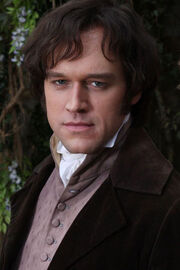
Elliot Cowen in Lost in Austen
- 1952: Peter Cushing
- 1940: Laurence Olivier
- 1967: Lewis Fiander
- 1980: David Rintoul
- 1995: Colin Firth
- 2004: Martin Henderson (Bride and Prejudice)
- 2005: Matthew Macfadyen
- 2008: Elliot Cowen
- 2012-2013: Daniel Vincent Gordh
- 2013: Matthew Rhys (Death Comes to Pemberley)
- 2016: Sam Riley (Pride and Prejudice and Zombies)
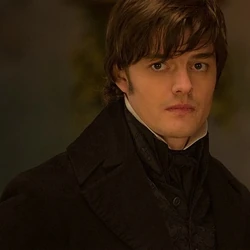
Sam Riley in Pride and Prejudice and Zombies

